Squirrels can be quite the pesky creatures when it comes to bird feeders. Not only do they scare away the birds or take over the feeders, but they can also snack on eggs and nestlings, which poses a threat to the bird population. However, there are several effective ways to keep these furry intruders at bay. Placing bird feeders at least 10 feet away from trees or structures that squirrels can climb is a good start. Additionally, using squirrel baffles on feeder poles can prevent them from jumping over. Another option is to opt for squirrel-proof bird feeders that are enclosed in cages, making it impossible for squirrels to access the food. Furthermore, weight-sensitive perches on bird feeders can close the doors to the feeder ports when squirrels attempt to grab a bite. While some bird seed with cayenne pepper added may deter squirrels, it is not always a foolproof solution. To attract birds without inviting squirrels, using bird seeds such as niger seed, white proso millet, and safflower seeds can do the trick, as squirrels tend to dislike them. However, providing separate low ground feeders for squirrels may temporarily divert their attention, but it can attract other pests. Opossums, for example, are considered pests due to the damage they can cause and the diseases they carry. With these preventive measures in mind, one can enjoy watching birds flocking to bird feeders without interference from squirrels.
Methods to Keep Squirrels Away from Bird Feeders
Placing Bird Feeders Away from Trees or Structures Squirrels Can Climb
One of the most effective methods to deter squirrels from bird feeders is by placing them at least 10 feet away from any trees or structures that squirrels can climb. Squirrels are agile climbers and can easily access bird feeders located near trees or buildings. By creating a significant distance between the feeders and potential climbing spots, it becomes more challenging for squirrels to reach the feeders, thus reducing their presence.
Using Squirrel Baffles on Feeder Poles
Squirrel baffles are another great tool to prevent squirrels from accessing bird feeders. These devices are typically placed on feeder poles and act as barriers, making it difficult for squirrels to climb up and reach the feeders. Squirrel baffles are typically made of smooth, slippery materials that squirrels can’t grip onto, effectively deterring them from attempting to climb past the baffles.
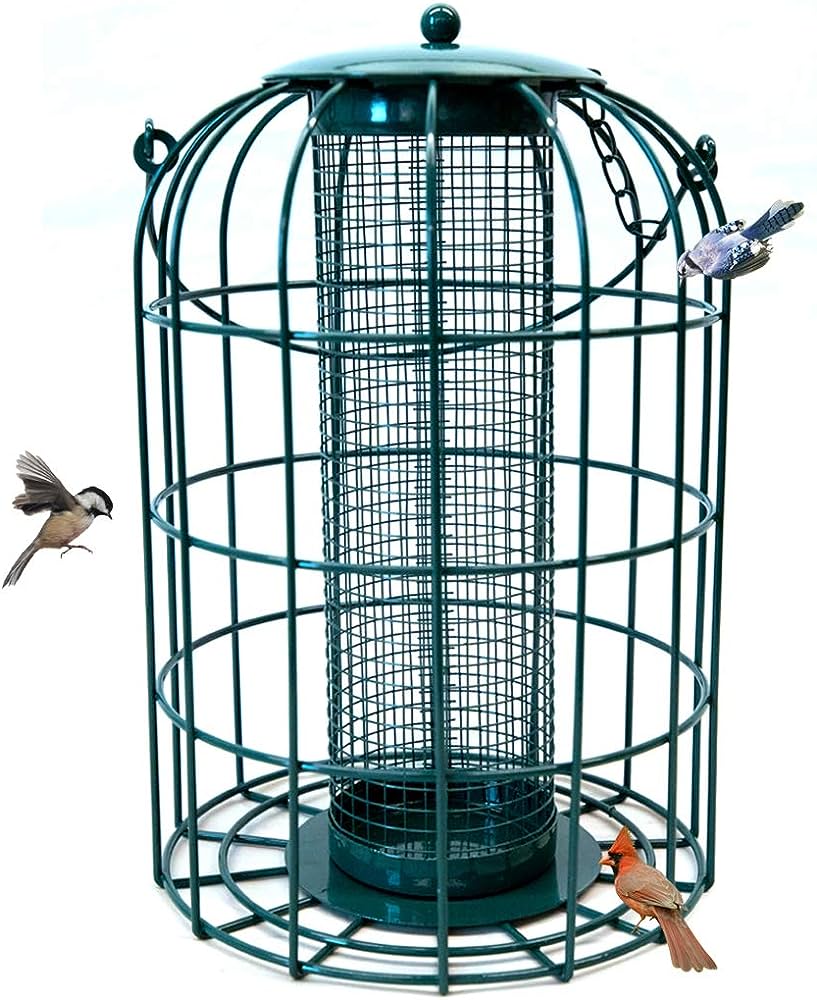
Utilizing Squirrel-Proof Bird Feeders Enclosed in Cages
Squirrel-proof bird feeders enclosed in cages provide an excellent solution for keeping squirrels away from the feeders. These feeders are designed with small openings that allow birds to access the food while keeping out larger animals such as squirrels. The cage surrounding the feeder acts as a physical barrier, preventing squirrels from accessing the food within. This method ensures that only birds can enjoy the feeders, without the interference of squirrels.
Implementing Weight-Sensitive Perches on Bird Feeders
Weight-sensitive perches on bird feeders can be an effective way to deter squirrels. These perches are designed to close the doors to the feeder ports when a squirrel puts its weight on them. By doing so, the feeder ports are blocked, preventing squirrels from accessing the food. Weight-sensitive perches make it challenging for squirrels to steal food from bird feeders while allowing birds to feed freely.
Alternative Solutions to Deter Squirrels
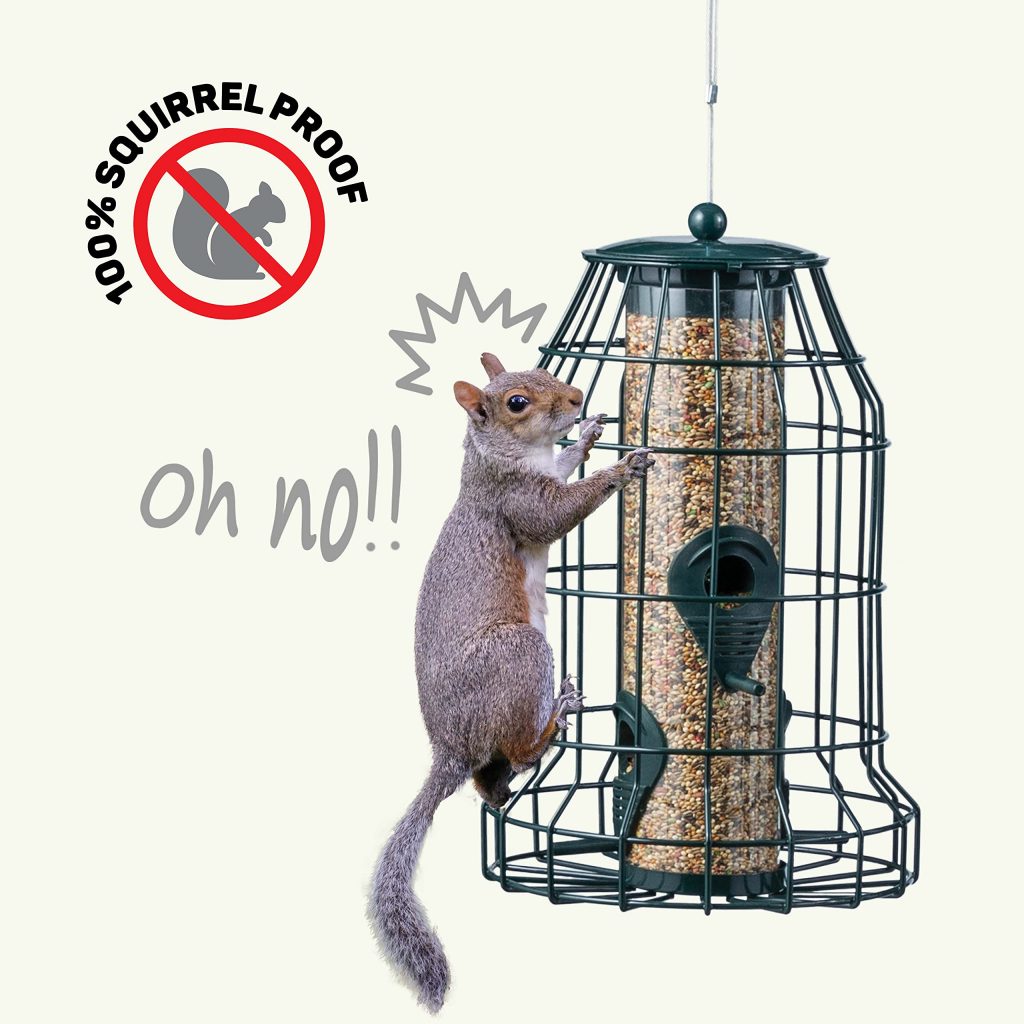
Using Bird Seed with Cayenne Pepper
Bird seed treated with cayenne pepper can act as a deterrent for squirrels. Squirrels have a strong sense of smell, and the pungent scent of cayenne pepper is disliked by them. Mixing cayenne pepper into bird seed can make it unappealing to squirrels, discouraging them from eating the seed. However, it is important to note that this method may not always work, as some squirrels may still be undeterred by the pepper.
Choosing Squirrel-Disliked Bird Seeds
Another alternative to deter squirrels is by using bird seeds that squirrels dislike. By selecting seeds that squirrels find unappetizing, it is possible to attract birds without attracting squirrels. Niger seed, white proso millet, and safflower seeds are some examples of bird seeds that squirrels are known to dislike. Including these seeds in bird feeders can help minimize squirrel activity while still providing nourishment to a diverse range of birds.
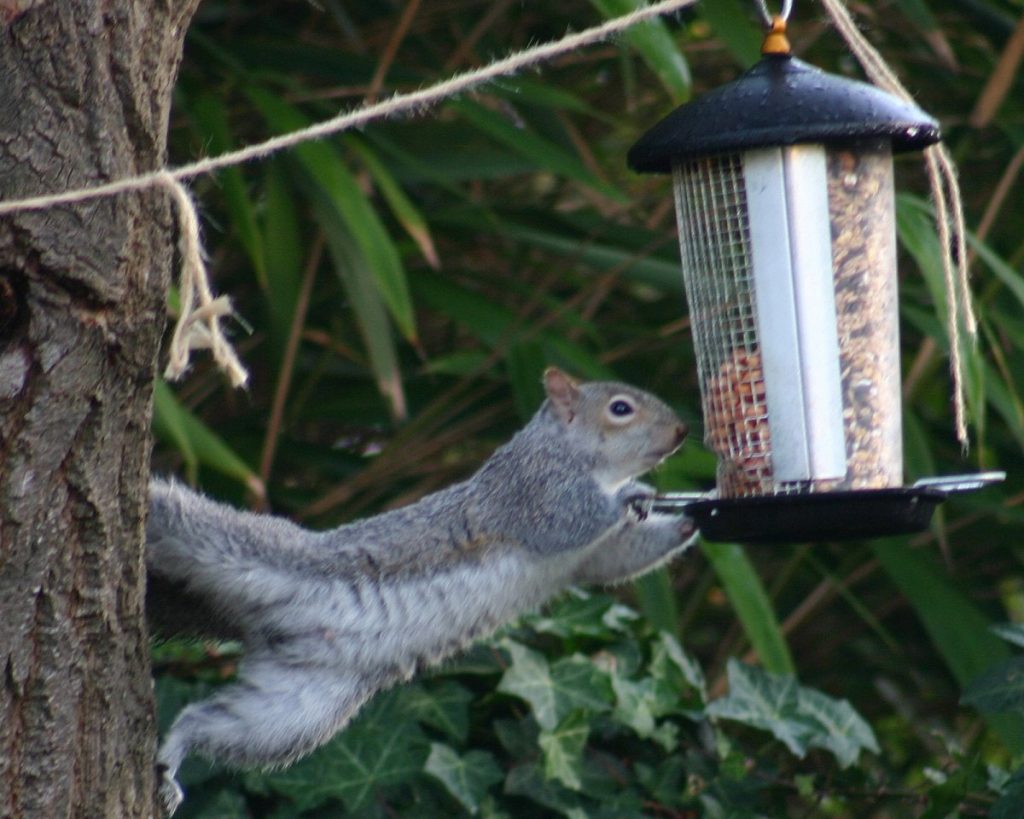
Providing Food for Squirrels on Separate Low Ground Feeders
To redirect the attention of squirrels away from bird feeders, it can be helpful to set up separate low ground feeders specifically for squirrels. By providing them with their own food source, squirrels are less likely to disrupt bird feeders in search of sustenance. However, it is essential to monitor these separate feeders to prevent them from attracting other pests such as raccoons or rats. Strategic placement and regular maintenance can help minimize the risks associated with separate squirrel feeders.
Risks Posed by Squirrels to Birds
Scaring Birds Away from Bird Feeders
Squirrels can act as a deterrent to birds by scaring them away from the bird feeders. The presence of squirrels can make birds feel threatened or unsafe, causing them to avoid the feeders altogether. This can impact the diversity of bird species visiting the feeders and hinder the enjoyment of bird watching.
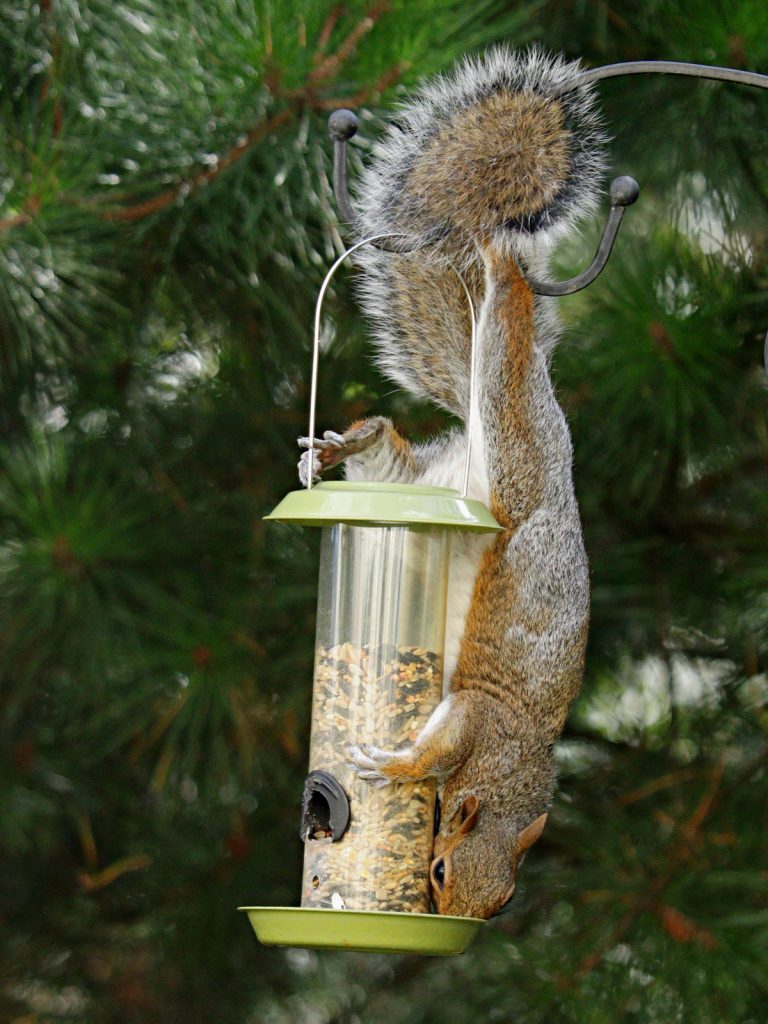
Taking Over Bird Feeders
Squirrels are notorious for taking over bird feeders, monopolizing the food meant for birds. They have the ability to consume large quantities of bird seed, leaving little or nothing for the intended avian visitors. This can be frustrating for bird enthusiasts who want to attract and support birds in their backyard.
Eating Eggs and Nestlings
While squirrels generally do not harm or eat adult birds, they can pose a threat to eggs and nestlings. Squirrels have been known to raid bird nests in search of food, consuming eggs or even preying on vulnerable baby birds. This predatory behavior can have a significant impact on local bird populations, disrupting the delicate balance of ecosystems.
Benefits of Squirrel-Proof Bird Feeders Enclosed in Cages
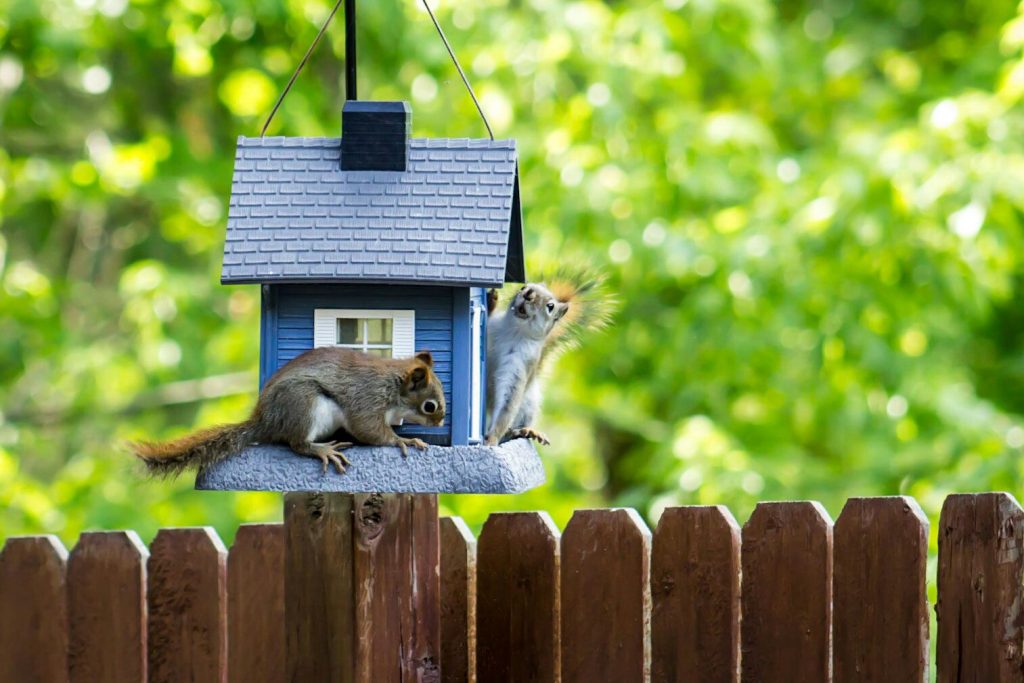
Preventing Squirrels from Getting into Bird Feeders
Squirrel-proof bird feeders enclosed in cages provide an effective solution to prevent squirrels from accessing the bird feeders. The specially designed cages create a physical barrier that keeps squirrels out while allowing birds to access the food within. This ensures that the intended avian visitors can enjoy the feeders without any interference from squirrels.
Protecting Birds and Their Eggs from Squirrel Intrusion
By effectively deterring squirrels from bird feeders, squirrel-proof feeders enclosed in cages also provide protection for birds and their eggs. With squirrels unable to access the feeders, the safety and well-being of bird species and their nesting sites are preserved. This is particularly important during breeding seasons when birds are most vulnerable to disturbances.
Implementation of Squirrel Baffles on Feeder Poles
Types of Squirrel Baffles
There are two main types of squirrel baffles commonly used on feeder poles: wrap-around baffles and top-mounted baffles. Wrap-around baffles are cylindrical in shape, fitting snugly around the feeder pole. They act as a physical barrier, preventing squirrels from climbing upward. Top-mounted baffles are dome-shaped and are placed above the feeder, making it difficult for squirrels to jump from above onto the feeders. Both types of baffles are effective in deterring squirrels and can be chosen based on individual preferences and feeder set-up.
Placing Squirrel Baffles Correctly to Prevent Jumping Over
To ensure the effectiveness of squirrel baffles, it is crucial to place them correctly on feeder poles. For wrap-around baffles, it is necessary to position them close to the ground, ensuring that there are no potential jumping points for squirrels to bypass the baffles. Top-mounted baffles should be placed at a sufficient height above the feeder to prevent squirrels from leaping over them. By carefully considering the positioning and installation of squirrel baffles, their ability to deter squirrels can be optimized.
Effectiveness of Bird Seed with Cayenne Pepper
Using the Optimal Concentration of Cayenne Pepper
The effectiveness of bird seed treated with cayenne pepper can vary depending on the concentration of pepper used. It is essential to strike a balance between a concentration that is unpleasant for squirrels while still being safe for birds. Too little cayenne pepper may not deter squirrels effectively, while an excessive amount could potentially harm birds. Following recommended guidelines and experimenting with different concentrations can help determine the optimal amount of cayenne pepper to use.
Challenges and Limitations of Cayenne Pepper as a Squirrel Deterrent
While bird seed with cayenne pepper can be an effective deterrent, it is essential to acknowledge the challenges and limitations associated with its use. Some squirrels may develop a tolerance or preference for the taste of cayenne pepper, rendering it ineffective. In addition, cayenne pepper may need to be reapplied regularly as rain or other weather conditions can diminish its potency. It is important to monitor the efficacy of cayenne pepper as a squirrel deterrent and explore alternative methods if needed.
Selection of Squirrel-Disliked Bird Seeds
Niger Seed: A Preferred Choice for Birds
Niger seed, also known as thistle seed, is highly preferred by many bird species including finches and sparrows. Squirrels, on the other hand, tend to find niger seed unpalatable. By incorporating niger seed into bird feeders, it is possible to attract a variety of bird species while minimizing the presence of squirrels.
White Proso Millet: A Highly Digestible Option for Birds
White proso millet is an excellent bird seed option that is well-liked by many bird species due to its high digestibility. Fortunately, squirrels do not share the same enthusiasm for this seed. By including white proso millet in bird feeders, it is possible to promote bird feeding while deterring squirrels.
Safflower Seeds: A Favorite of Cardinals and Other Songbirds
Safflower seeds are a popular choice for bird enthusiasts looking to attract vibrant species such as cardinals and other songbirds. Fortunately, squirrels tend to dislike the taste of safflower seeds, making them an effective deterrent for these persistent rodents. Including safflower seeds in bird feeders can provide a colorful and lively bird-watching experience while minimizing squirrel interference.
Considerations When Providing Food for Squirrels on Separate Feeders
Potential Attraction of Other Pests
While providing separate low ground feeders for squirrels can help divert their attention from bird feeders, it is important to consider the potential attraction of other pests. Raccoons, rats, and other animals may also be enticed by the food provided for squirrels. This can lead to an increase in unwanted wildlife activity in the vicinity of the feeders, potentially causing additional problems or disturbances.
Strategies to Minimize Pest Attraction
To minimize the risk of attracting other pests, it is crucial to employ strategies alongside separate squirrel feeders. Placing the squirrel feeders away from structures that can provide hiding spots for pests, such as buildings or dense vegetation, can help discourage unwanted visitors. Regularly cleaning the feeders and the surrounding area will also help reduce the presence of food debris that can attract pests. The careful selection of squirrel food can further minimize the likelihood of attracting unwanted wildlife.
Opossums as Pests and Carriers of Diseases
Damage Caused by Opossums
Opossums are known to cause damage when they invade bird feeding areas. They can knock down bird feeders, damage the feeders themselves, and scatter bird seed in their search for food. These behaviors can be disruptive, expensive, and frustrating for bird enthusiasts. Taking measures to deter opossums from bird feeders is essential to minimize this damage.
Diseases Transmitted by Opossums
In addition to the damage they cause, opossums are also carriers of diseases. They can transmit diseases such as leptospirosis, tuberculosis, and spotted fever to other wildlife, pets, and even humans. Their presence in close proximity to bird feeders increases the risk of disease transmission. Therefore, it is crucial to discourage opossums from accessing bird feeders to maintain a healthy environment for both birds and humans.
In conclusion, there are several effective methods to keep squirrels away from bird feeders. Placing the feeders away from trees or structures squirrels can climb, using squirrel baffles on feeder poles, utilizing squirrel-proof bird feeders enclosed in cages, and implementing weight-sensitive perches are all viable options. Alternative solutions such as using bird seed with cayenne pepper, selecting squirrel-disliked bird seeds, or providing separate low ground feeders for squirrels can also be employed. It is important to be mindful of the risks posed by squirrels to birds, including scaring birds away, taking over bird feeders, and consuming eggs and nestlings. Squirrel-proof bird feeders enclosed in cages provide numerous benefits by preventing squirrel access and protecting birds and their eggs. Implementation of squirrel baffles on feeder poles and the strategic use of bird seed with cayenne pepper or squirrel-disliked seeds can also be effective. Additionally, considerations should be taken into account when providing food for squirrels on separate feeders to minimize the attraction of other pests. Lastly, opossums can cause damage and transmit diseases, making it essential to deter them from bird feeding areas. By implementing these methods and being informed about the potential risks and benefits, bird enthusiasts can create an environment that fosters bird feeding while minimizing squirrel interference.
Leave a Reply